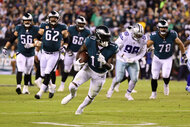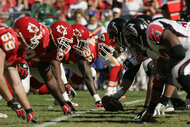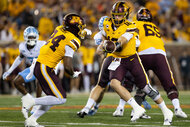Create a free profile to get unlimited access to exclusive show news, updates, and more!
How Do the NFL Playoffs Work? A Quick Guide to the Postseason
Let's take a quick look at the way NFL postseason games work.
The 2023 NFL Season Playoffs are officially over, culminating in a victory for the Kansas City Chiefs in Super Bowl LVIII. It was another thrilling postseason full of upset victories, thrilling endings, and great athleticism, but if you're new to the NFL, the way it all went down might have left you with a few lingering questions.
Why are there an odd number of teams in each conference heading to the Playoffs? How does seeding work? What happens if two teams have the same record? Well, we're here to help. From the Wild Cards to the Super Bowl, here's a quick guide to how the NFL Playoffs work.
Who Makes the NFL Playoffs?
The short answer to making the Playoffs in any given year boils down to a very simple concept: Win as many games as possible. Obviously, the teams who win the most games are the teams who get to compete in the postseason, but if you're looking for a more in-depth explanation, things get slightly more complex.
RELATED: Dolphins-Chiefs Wild Card Game on Peacock Breaks All-Time Streaming Record
Both of the NFL's two conferences –– the American Football Conference (AFC) and the National Football Conference (NFC) –– send seven teams to the playoffs, for a grand total of 14 competitors in the postseason. The number one seed, meaning the winningest team, from each conference, gets not only an automatic playoff berth, but the coveted position of skipping the first round entirely and sitting pretty in the second round, just waiting for their first opponent. This season, the Baltimore Ravens of the AFC and the San Francisco 49ers of the NFC clinched the top seeds in their conferences, securing their places in the second round while everyone else battled it out in the first.
So, that's one of seven slots down for each conference. Three more in each conference go to the division champions within the conference's four divisions (the number one seed is also a division champion). This year's NFC division champions included the 49ers in the NFC West, the Dallas Cowboys in the NFC East, the Detroit Lions in the NFC North, and the Tampa Bay Buccaneers in the NFC South, while the AFC ended up with the Ravens in the AFC North, the Buffalo Bills in the AFC East, the Houston Texans in the AFC South, and the Kansas City Chiefs in the AFC West.
The other three slots in each conference go to "Wild Card" teams. These are the teams that, regardless of their status within their division, have the best remaining records in the conference. For example, the Baltimore Ravens won their division, the AFC North, but fellow AFC North team the Cleveland Browns did well enough this season to come in second in their division and third in the AFC overall in terms of their win-loss record. So, the Ravens advanced as division champions (and, in this case, the top overall seed in the conference) and the Browns advanced as a Wild Card team. The AFC's other two Wild Card teams this year were the Pittsburgh Steelers and the Miami Dolphins, while the NFC Wild Card selections were the Philadelphia Eagles, the Green Bay Packers, and the Los Angeles Rams.
So, each conference ends up with seven teams with a clear record that allows them to advance to the playoffs, but of course, there are occasional ties. If two teams have the same record and a playoff spot is on the line, the NFL employs a number of tiebreaking factors, including how the teams fared when they played each other, how they fared in terms of win percentage within their division, strength of schedule, and more. One way or another, though, each conference ended up with seven teams, all with a chance to make it to the Super Bowl.
How Does the Playoff Bracket Work?
Once the seven teams are picked, they are each assigned a seed number based on their record and any required tiebreaking factors. The winningest team is the 1 seed, the team with the most losses is the 7 seed, and everyone else fills in accordingly. As we already discussed, the 1 seed team gets to skip the first round entirely and just rest up for the second round, waiting and watching to see who they'll face. Everyone else has to play the Wild Card round.
The Wild Cards feature three games per conference, for six games total, and each game is arranged according to seeding numbers, with the highest seed playing the lowest seed, the second highest playing the second lowest, and so on. So, the 2 seed plays the 7 seed, the 3 seed plays the 6 seed, and the 4 seed and 5 seed play each other. If you've got the higher seed number in your matchup, you get the home field advantage for the game. Winners move on to the Division round.
Once you get to the Divisional round, the same seeding rules apply, with the lowest remaining seed playing the 1 seed (who has automatic home field advantage for the entirety of the Playoffs), the second lowest remaining seed playing the second highest, and so on. For example, in this year's Wild Card round the seven seed Green Bay Packers defeated the two seed Dallas Cowboys, so they advanced to play the top remaining seed, the one seed San Francisco 49ers, in the Divisional matchup.
RELATED: How to Watch the Buccaneers vs Lions NFC Divisional Playoff Game
The Divisional Round features four teams per conference –– the three Wild Card winners and the 1 seed from each conference –– for a total of four games across the league. The two winners from each conference's Division round will then play each other in the Conference Championship.
That game, as the name implies, determines who wins the Conference for that year, and is played at the home field of the highest remaining seed in the bracket. The winners of each of those two games -- this year it was the San Francisco 49ers and the Kansas City Chiefs -- are the NFC and AFC Champions, and go on to play each other in the Super Bowl.
When Are the NFL Playoffs?
The NFL season is long, running from preseason games in August to the end of the regular season in early January. Then it's officially Playoff time, with three weeks of games usually beginning around mid-January, culminating in the Conference Championships. Then, everyone takes a week off for the annual Pro Bowl, and then it's on to the Super Bowl. The 59th installment of the Big Game will arrive Feb. 9, 2025 at the Superdome in New Orleans. That means about six months of waiting for more NFL football, and almost a year of waiting for the next Super Bowl. Enjoy the offseason!
For more NFL news, head to NBC Sports.
Originally published Jan 2, 2024.



















